

MASAKO YANO
Published on Apr 01, 2022
The United Nations designates March 8 as the International Women’s Day. On this day, to celebrate and support women’s social, economic, cultural, and political achievements worldwide, HENNGE Employee Empowerment Section (EE) and Internal Relations and Communication Section (IRC) jointly hosted an online panel discussion, inviting HENNGE female members including our new outside directors as the panelists, and about 130 employees watched the event. Here is the summary of the discussion.
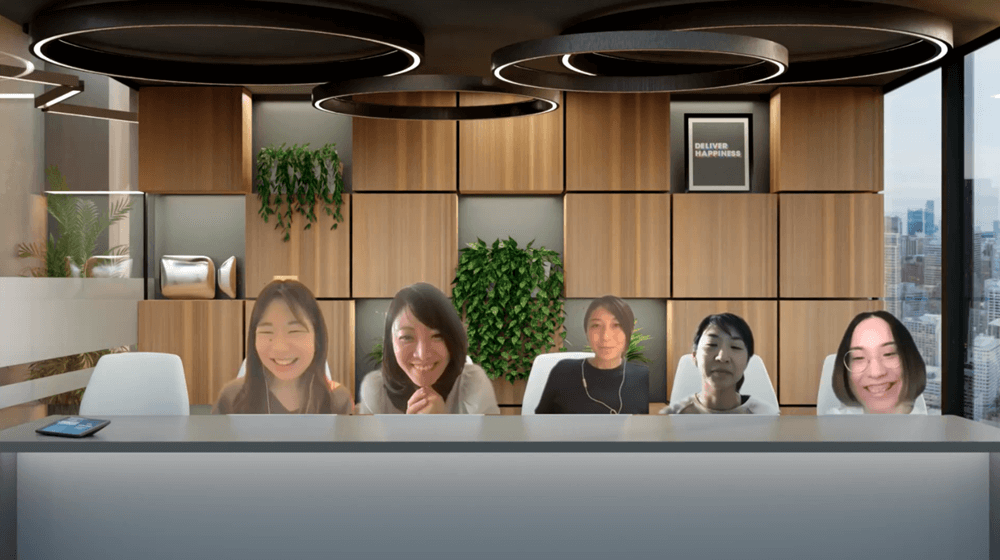
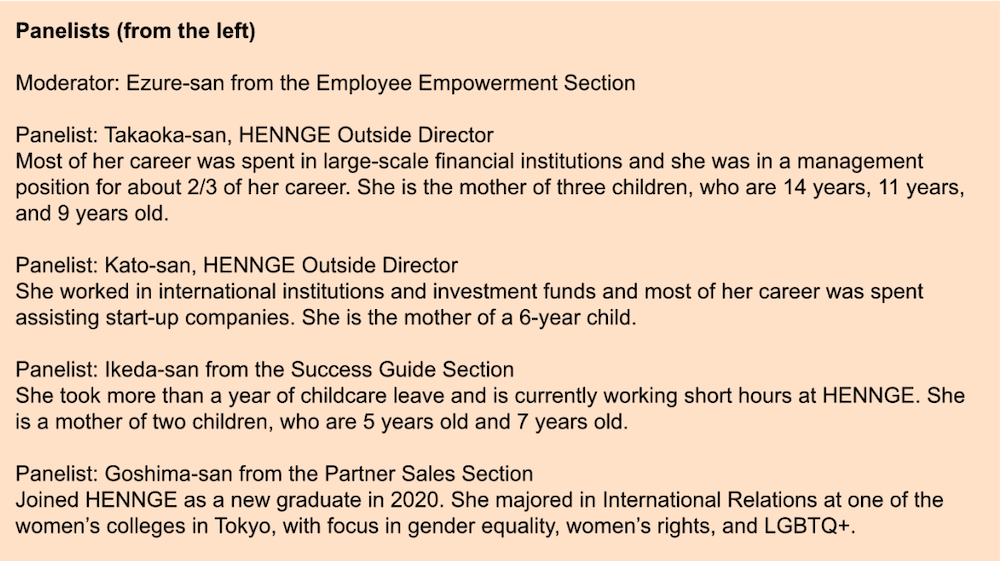

First, I would like to explain whatInternational Women’s Day is. In 1977, the United Nations officially recognized International Women’s Day to celebrate and honor women’s achievements and to increase awareness on women’s rights and gender equality.
Throughout history, women struggled to gain rights and participate in the politics. International Women’s Day is a day to celebrate the past, present, and future courage of women.
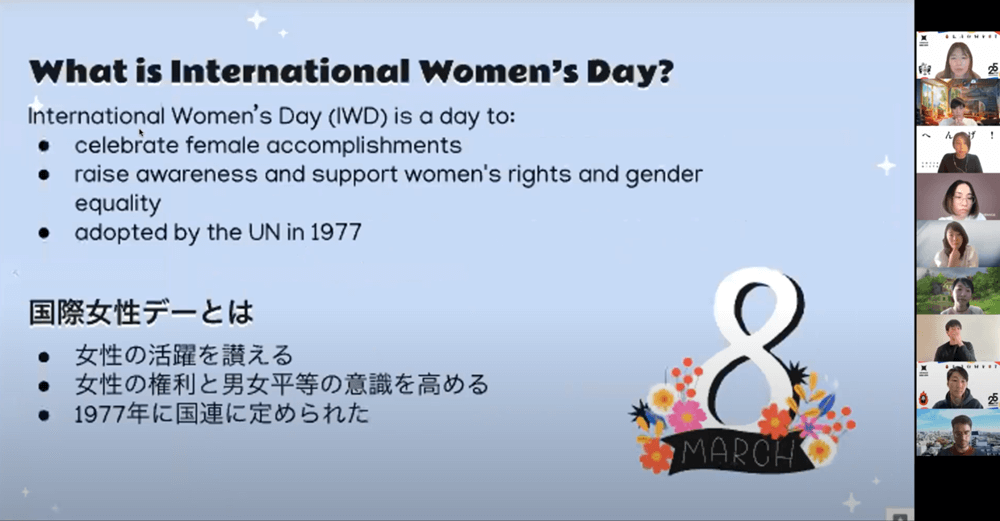

Some people may wonder why we need to discuss the gender issues in Japan. According to the latest Gender Gap Index announced by the World Economic Forum, Japan ranked 120th among 156 countries, which was one of the lowest levels as a developed company. The ranking is based on the low participation in politics by women compared to men and the pay gap between men and women in Japan.
And HENNGE is not a total exception. We still have room for improvement, such as the ratio of female management at HENNGE. The first step to solve gender inequalities is to better understand each other. Based on that, let’s exchange opinions!


In this panel discussion we would like the panelists to answer some questions we collected from HENNGE members. So, let’s go to the first question.
“What kind of role model(s) do you have as you pursue your life and career?”

I started my career at the Tokyo office of one of the global investment banks. Many of their female workers were mothers with children and they had different work styles, such as those who worked short hours, those who lived with their parents to have them assist with child care, those who had baby sitters, and so on. There were many role models and I was deeply impressed that women who pursued their careers did not have to give up on everything else. My husband who worked in the same office must have felt that there was no single stereotypical work-life balance. Regardless of gender, it is important to be involved with many different types of people.

Do you think that those women who are able to have both family and career were blessed with that environment or did they make the effort themselves?

One of the global companies I joined right after I graduated from university was promoting diversity and inclusion from early days. There was a company-internal community to share information on babysitters and a childcare facility for employees, for example. The company was making efforts to centralize the knowhow and to take effective measures through trial and error.


I can see that there was a lot of support from the company and the community. It is not only the personal responsibility of each woman nor the responsibility of the company and the community only, it is shared altogether, that is an important point. Thank you very much. Let’s go to the next question.
“Do you have any goal that you would like to achieve for your career or for your personal life? What are your obstacles and what kind of support would you like to have?”

I don’t have a concrete dream or goal myself, but I would like to keep working, until I am 60 years old or even 70 years old, in whatever form or manner. Also, at HENNGE, my managers and team support me a lot but even in such a wonderful environment, I feel guilty when I have to excuse myself from work due to family reasons while they are busy. I believe all working mothers feel the same way.

My personal goal is to become and remain independent financially.
My goal for gender equality is to contribute to establish a society where women do not have to stand up and speak up in order to ensure their rights.
Gender issues, such as the pay gap between men and women and less women participating in politics, have a long history, but many women are taking actions to make changes. And I believe that this event is a wonderful opportunity for women to talk about their rights.

Thank you very much for your powerful message! It is encouraging to hear such ideas from a woman of my generation. Here is the next question.
“What kind of obstacle did you encounter because of being a woman and how did you overcome it?”

I don’t want to call it an obstacle, but giving birth to and raising a child was quite a challenge. Children are the most beautiful gifts in life but it was the challenge of a lifetime as well. After I took my MBA overseas, I started to work for an investment fund, and that was when I found out that I was pregnant. In my workplace, there were mostly men and there was no female role model, who was working and raising a child at the same time. Therefore, I was happy that I was pregnant but at the same time, I went into a panic. I contacted other women who were successful in their career while raising children and tried to find out how, but everybody had their own way, which were all different. Therefore, I personally decided to make full use of automation and outsourcing. So, I bought a fully automatic washing machine and contracted with a housekeeping service. Also, I had a candid discussion with my husband and we shared the housework. I asked for help from my parents-in-law as well.
From this experience, I learned the importance of openly asking for help and trying to share the burden with people around you. There is no right answer which works for everybody. So, don’t be afraid and talk with your family members and colleagues.

Thank you for the valuable advice. It seems that making decisions on your own after collecting information and stories from many people was the key. Let’s go to the next question.
“How should we solve the cultural issue that causes the pay gap between men and women?”

The pay gap between men and women is significant in Japan, we are said to be the third from the worst among the OECD member countries. And It is because of the strong stereotypes remaining in Japan, which is that men go to work and women take care of the family at home. The chart below shows the ratio of male and female non-regular employees in Japan. The ratio for men is 22.2% while for women, it is 54.4%. The gap is substantial.
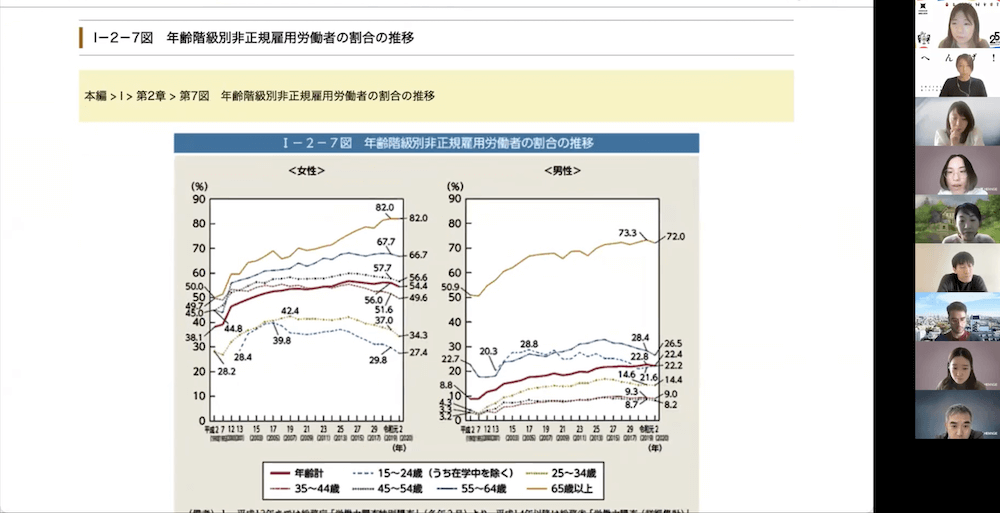
Source: Japan Cabinet Office, Gender Equality Bureau, Share Trends of Non-regular Employees by Age Group in Japan
https://www.gender.go.jp/about_danjo/whitepaper/r03/zentai/html/zuhyo/zuhyo01-02-07.html
Chart 1-2-7 Share Trends of Non-regular Employees by Age Group in Japan
Left chart is for women and the right chart is for men.
The red line represents the total of all the age groups.
The dotted blue line shows the age group of 15-24 years old except those who are students at schools

Regarding how to resolve this particular issue, I found these guidelines on correcting the pay gap between men and women for your reference.
These guidelines state that “enhancing transparency on the salaries and wages”, “defining work with equal value and reviewing the definition periodically”, “no inquiry on past salary history” and “promoting flexible work style”, which companies can start working on.

It is hard to neglect our cultural background but the guidelines sound good for companies to make a first step in establishing a better work environment.
The next question is…
“What do you think of colleagues who are taking on the burden of increased workload due to their teammates’ life events?”
Ikeda-san, you said you felt guilty when you were not able to work for long hours in order to take care of your family”.

Yes, no matter how helpful and understanding your colleagues are, I feel guilty towards my team when I leave work to make myself available for my family.

Regardless of their genders, people who temporarily take a leave or who work short hours because of their families must be constantly struggling with various responsibilities. Takaoka-san, you have been in a supervising position at several organizations. Please share your views from the management point of view.

I have experienced both sides myself. When I first started to work, there was a senior member who had to leave the office at 6:00pm to pick up her child. At that time, working from home was never an option, so I had to take over all the work from 6:00pm until the next morning and honestly, it was tough. Therefore, when I became a mother, I wanted to make sure that my colleagues did not have to go through the same situation. The solution I found was to choose a project-based assignment for myself. That way, it was easier to make necessary arrangements, such that when I was off the project, my family was the priority and if my child got sick suddenly, I was able to take care of my child without causing too much trouble to my colleagues. And when I was working on a project, I was able to ask my other family members to take care of the family matters.
However, looking back, this is not a solution for everybody and we must communicate and coordinate with our colleagues and family members. Working mothers must not feel guilty and responsible and struggle to find a solution alone. It is better to talk it through with people around them and find a backup solution together.

That is so true. There is not only one answer and we all need to work together for the best arrangement from each other’s standpoint.
Let’s go to the next question.
“What is your vision on promoting diversity and inclusion at companies?”

I will take this question.
HENNGE respects employees’ diversity and we are working in a global and diverse environment. Since our employees are all different in gender, nationality, age, and sexual orientation, we may all have issues which are different. Since we know that our diversity is in fact our strength at HENNGE, we will constantly work hard to make our working environment comfortable for everyone by exchanging our opinions on many different issues that may take place in the company and to resolve them company-wide and team-wide.

Next question is with respect to our actions.
“I don’t know much about International Women’s Day. What actions should we take as a starting point?”


I did not know much about International Women’s Day, either. In general, I think that women tend to underestimate their power. Therefore, my suggestion is to challenge that notion, since you are mostly performing better than you think. So, feel proud of yourself. If you are a manager, please give your team positive feedback to boost their confidence.

Let’s take it as a good occasion to review our own behaviors, prejudices and fixed concepts we may have on a special day like International Women’s Day. As for actual actions which we can take, for example, my team reviewed our hiring process from the diversity point of view and made sure we would meet and interview sufficiently diverse candidates to choose one person.

It is important to spend time to make consideration on such issues and to take actions if there is any room for improvements. Now our panel discussion is coming close to its end. Lastly, I would like to have a message from each panelist.

I am glad if today’s discussion gave you a chance to know about women’s rights and possible prejudice we may have deep inside of our minds. Thank you very much!

I believe that this kind of effort will have a positive impact on our business as well. Japan is said to be a homogeneous country but it can also mean that our views may be narrow and it is hard for new ideas and opinions to be formed. Our discussion today must have broadened our views.
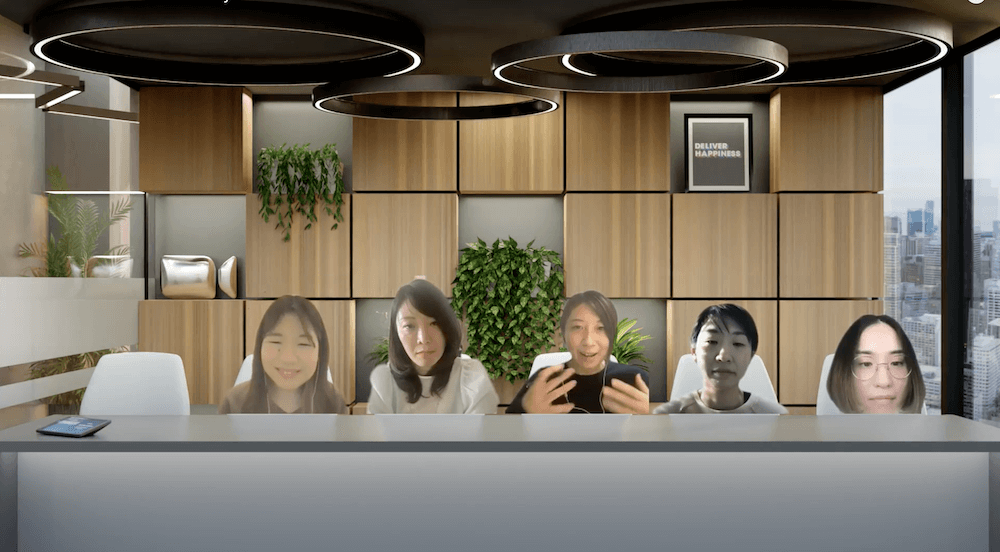

HENNGE continues to provide more services to our more diverse clients and to deal with various issues. Therefore, it is important that we celebrate diversity and understand it. It was also a great opportunity to speak with HENNGE members directly. In the near future, I would like to have another similar session offline as well.

I was encouraged that there are a lot of male participants today, which means that they are interested in this kind of topic as well. I have always felt that a person who knows what it feels like to be a minority is resilient in the global environment, since the global environment is full of diversity. Therefore, in order for HENNGE to become a real global company, we must not only know about minority-related issues but all of us must try to put ourselves in their shoes. We could not cover everything during this session but we hope that it gave you some ideas on what diversity, equality, and inclusion really mean.

I thank all the panelists today. In order to further promote equality and inclusion at HENNGE, all the HENNGE members must recognize their importance and necessity. And for that, we will stay open-minded, learn from each other’s experience, and continue our discussion.
Thank you very much for your participation today!

MASAKO YANO
Published on Apr 01, 2022
Hello everybody! I am so happy to see so many participants today, regardless of their gender.
This event was organized in the spirit of one of our HENNGE Way Behavioral Guidelines, which is to “Accept Diversity and Promote Inclusion”. HENNGE respects diversity of ideas, workstyles, culture, and language but after all HENNGE is just one of many companies and it is only a very small part of a huge society. In order to make our society a better place, we would like to spread the HENNGE spirit to other communities and that is why we hosted this event to discuss women’s rights, which is one of the social issues.